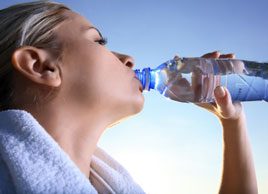How to stay hydrated while you exercise
Hydration is key when you’re exercising. Here’s what to drink before, during and after your workout

Source: Best Health Magazine, November 2011
For better results from your fitness routine, stay hydrated, advise Calgary-based Hayley Wickenheiser, captain of the Canadian National Women’s Hockey Team, and her trainer, Ryan van Asten.
‘When I’m dehydrated, my legs feel heavy and I don’t have the same muscle power or accuracy I normally have,’ says Wickenheiser. Van Asten, a certified exercise physiologist, and a strength and conditioning specialist who works with the hockey team as well as other Olympic athletes, explains that dehydration can reduce the volume of blood pumped by the heart. That means less oxygen to the muscles, which may result in premature fatigue. And remember that a dry mouth, or being parched or thirsty, indicate that you’re already dehydrated.
Before you grab a bottle of water or a carbohydrate or electrolyte drink, here’s some advice from Wickenheiser and van Asten.
Stay hydrated before your workout
You shouldn’t have to chug water before you exercise‘whether working out or not, it’s important that you stay hydrated all day long. If you do drink too much fluid (either water or a sport drink) before physical activity, it may cause bloating and cramping, which you don’t want to happen. Van Asten has his athletes drink three litres of water daily, even on rest days. In fact, he recommends this for anyone who is active.
How to stay hydrated during your workout
While you work out, you lose water through perspiration and breathing. Van Asten recommends drinking plain tap water during low- or moderate-level exercise to replenish what’s lost. A rule of thumb, he says, is one cup (250 mL) for every 15 minutes of exercise.
There are carbohydrate drinks with sugar to replenish glycogen (what your muscles burn for energy) and electrolyte drinks with sodium and potassium (some also have chlorine), which help to rehydrate and improve muscle function. Many carb beverages contain some electrolytes, and you can buy electrolyte powder packs to add to a bottle of water or a carb drink.
‘I always have water with lemon during a workout to ‘alkalize’ my system so that it’s not too acidic,’ says Wickenheiser, who often has an electrolyte drink, too. (Although lemon juice is acidic, it is thought to induce the body to balance that by becoming more alkaline.)
It’s important to lower the acidity in your system, she says, because in hockey and weight training, the body produces a lot of lactic acid’which is what makes muscles and joints feel fatigued during physical activity. Many athletes try to avoid it so they can train longer.
Stay hydrated after a workout
Continue to drink water after a workout. If you do any weight-bearing exercise, consider adding protein powder to your water or carb drink. ‘This helps with muscle and protein synthesis,’ says van Asten. ‘Muscles go into a catabolic state after weight training, meaning they break down, and that continues even after the workout. Protein can help muscles heal.’ Of course, a protein-carbohydrate meal or snack works, too. (Wickenheiser eats something like chicken stir-fry or fish with brown rice and veggies post-workout.)
There are also carb-protein sports drinks on the market. Just be sure that the ratio is two to three grams of carbohydrates per one gram of protein, says van Asten. (Check the label.) One of his favourite carb-protein muscle recovery drinks? A two-cup (500-mL) serving of chocolate milk. Wickenheiser will sometimes have a half scoop of whey protein powder mixed with Ultima, an all-natural sports drink.
This article was originally titled "Drink up!" in the November 2011 issue of Best Health. Subscribe today to get the full Best Health experience’and never miss an issue!




